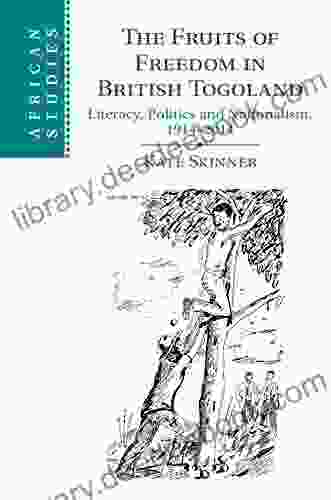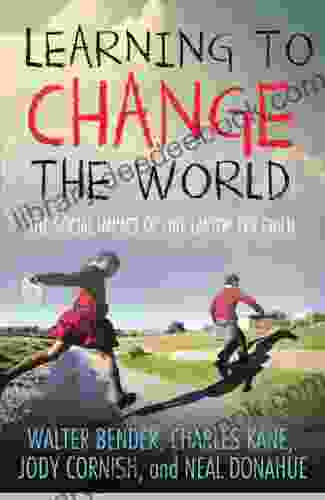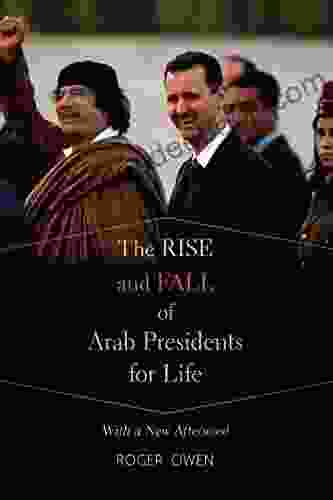Literacy Politics and Nationalism: 1914-2024 African Studies 132

Literacy is a fundamental human right. It is essential for personal development, social progress, and economic growth. However, in many parts of the world, literacy rates remain low. This is especially true in Africa, where only about two-thirds of the population can read and write.
Literacy is not simply a matter of being able to decode words. It is also about being able to understand and use written information. This includes being able to read and write in one's own language, as well as being able to access and use information in other languages.
Literacy is a powerful tool. It can be used to empower individuals and communities. It can also be used to control and manipulate people. Throughout history, literacy has been used by both colonizers and nationalists to further their own agendas.
4.1 out of 5
| Language | : | English |
| File size | : | 2823 KB |
| Text-to-Speech | : | Enabled |
| Enhanced typesetting | : | Enabled |
| Word Wise | : | Enabled |
| Print length | : | 314 pages |
| Screen Reader | : | Supported |
When Europeans arrived in Africa in the 19th century, they brought with them their own languages and writing systems. These languages and writing systems were used to communicate with African elites and to control the African population.
Missionaries played a major role in spreading literacy in Africa. They established schools and taught Africans to read and write in European languages. This education was often used to convert Africans to Christianity and to instill in them European values.
Colonial governments also used literacy to control the African population. They required Africans to have a certain level of literacy in order to get a job or to vote. This policy was designed to create a literate elite that would be loyal to the colonial government.
Literacy played a key role in the development of African nationalism. African nationalists used literacy to spread their ideas and to mobilize the African population against colonial rule.
One of the most famous examples of this is the work of Kwame Nkrumah, the first president of Ghana. Nkrumah was a prolific writer and speaker. He used his literacy skills to spread his message of Pan-Africanism and to inspire Africans to fight for their independence.
Other African nationalists also used literacy to promote their cause. For example, Léopold Sédar Senghor, the first president of Senegal, was a poet and writer. He used his writing to express his vision of an independent Africa.
After independence, African governments continued to use literacy as a tool of political mobilization and control. However, they also began to focus on expanding access to education for all citizens.
This led to a significant increase in literacy rates in Africa. However, there are still large disparities in literacy rates between different regions of the continent. For example, literacy rates are much higher in North Africa than in Sub-Saharan Africa.
African countries face a number of challenges in promoting literacy in the 21st century. These challenges include:
- Poverty: Poverty is a major barrier to literacy. Many African families cannot afford to send their children to school.
- Lack of access to education: Many African children do not have access to quality education. This is especially true in rural areas.
- Low quality of education: The quality of education in many African countries is low. This is due to a number of factors, including a lack of qualified teachers and a shortage of resources.
- Negative attitudes towards literacy: Some African cultures have negative attitudes towards literacy. This is especially true among women and girls.
Despite these challenges, there are also a number of opportunities for promoting literacy in Africa in the 21st century. These opportunities include:
- Technology: Technology can be used to improve access to education and to make learning more engaging. For example, mobile phones can be used to deliver educational content to remote areas.
- Increased awareness of the importance of literacy: There is a growing awareness of the importance of literacy in Africa. This is due in part to the efforts of international organizations, such as UNESCO.
- Political will: Many African governments are committed to promoting literacy. This is reflected in the fact that many countries have adopted national literacy policies.
Literacy is a fundamental human right. It is essential for personal development, social progress, and economic growth. However, in many parts of the world, literacy rates remain low. This is especially true in Africa, where only about two-thirds of the population can read and write.
African countries face a number of challenges in promoting literacy in the 21st century. These challenges include poverty, lack of access to education, low quality of education, and negative attitudes towards literacy. However, there are also a number of opportunities for promoting literacy in Africa in the 21st century. These opportunities include technology, increased awareness of the importance of literacy, and political will.
Literacy is a powerful tool. It can be used to empower individuals and communities. It can also be used to control and manipulate people. Throughout history, literacy has been used by both colonizers and nationalists to further their own agendas.
In the 21st century, literacy will continue to play a key role in the development of Africa. It is essential that African countries make literacy a priority and invest in programs that promote literacy for all citizens.
4.1 out of 5
| Language | : | English |
| File size | : | 2823 KB |
| Text-to-Speech | : | Enabled |
| Enhanced typesetting | : | Enabled |
| Word Wise | : | Enabled |
| Print length | : | 314 pages |
| Screen Reader | : | Supported |
Do you want to contribute by writing guest posts on this blog?
Please contact us and send us a resume of previous articles that you have written.
 Novel
Novel Page
Page Chapter
Chapter Story
Story Genre
Genre Reader
Reader Library
Library Paperback
Paperback Magazine
Magazine Sentence
Sentence Bookmark
Bookmark Shelf
Shelf Glossary
Glossary Foreword
Foreword Preface
Preface Manuscript
Manuscript Codex
Codex Library card
Library card Biography
Biography Memoir
Memoir Dictionary
Dictionary Thesaurus
Thesaurus Librarian
Librarian Card Catalog
Card Catalog Borrowing
Borrowing Stacks
Stacks Archives
Archives Study
Study Reserve
Reserve Academic
Academic Journals
Journals Reading Room
Reading Room Interlibrary
Interlibrary Study Group
Study Group Thesis
Thesis Dissertation
Dissertation Storytelling
Storytelling Reading List
Reading List Book Club
Book Club Textbooks
Textbooks Daniel Kenney
Daniel Kenney Juan Paolo Perre
Juan Paolo Perre Elizabeth Lim
Elizabeth Lim Kell Frillman
Kell Frillman Stan Berenstain
Stan Berenstain Liza Palmer
Liza Palmer Johann David Wyss
Johann David Wyss Niki Lee
Niki Lee Zabihollah Rezaee
Zabihollah Rezaee C Coco De Young
C Coco De Young Vicki Ohl
Vicki Ohl Roland Pietsch
Roland Pietsch Bella Thorne
Bella Thorne E R Fallon
E R Fallon Donald H Young
Donald H Young Wilhelm Busch
Wilhelm Busch Jack Wiley
Jack Wiley Pauline Chandler
Pauline Chandler Dr Rhyme Alot
Dr Rhyme Alot Rick Mattingly
Rick Mattingly
Light bulbAdvertise smarter! Our strategic ad space ensures maximum exposure. Reserve your spot today!

 Richard SimmonsIntroducing the Iron Hand Battlegroup: An Unwavering Force in the Warhammer...
Richard SimmonsIntroducing the Iron Hand Battlegroup: An Unwavering Force in the Warhammer... Edison MitchellFollow ·3.8k
Edison MitchellFollow ·3.8k Carter HayesFollow ·7.3k
Carter HayesFollow ·7.3k Mark MitchellFollow ·4.6k
Mark MitchellFollow ·4.6k Galen PowellFollow ·15.5k
Galen PowellFollow ·15.5k Edwin BlairFollow ·18.2k
Edwin BlairFollow ·18.2k Jesus MitchellFollow ·16.2k
Jesus MitchellFollow ·16.2k Langston HughesFollow ·15.3k
Langston HughesFollow ·15.3k William FaulknerFollow ·16.7k
William FaulknerFollow ·16.7k
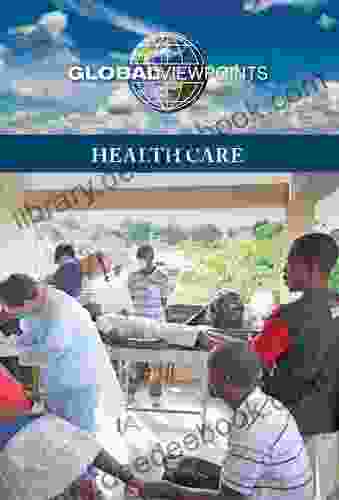
 Ralph Ellison
Ralph EllisonHealth Care Global Viewpoints: Samantha Whiskey
Samantha Whiskey is a global health...
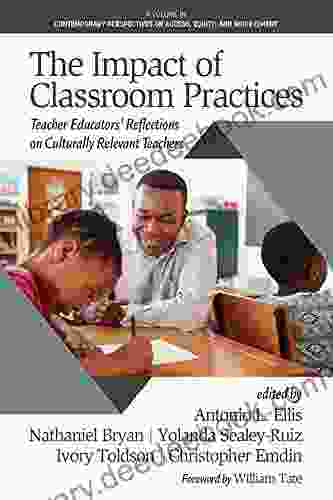
 Gabriel Garcia Marquez
Gabriel Garcia MarquezTeacher Educators' Reflections on Culturally Relevant...
In today's...

 Levi Powell
Levi PowellSustainable Project Management: The GPM Reference Guide...
In today's rapidly changing world,...

 Isaac Bell
Isaac BellThe Captivating World of "Dreaming Awake Falling Under"
A Journey Through...

 Clarence Brooks
Clarence BrooksGovernance Regulations Valuations Mergers And...
In today's complex and ever-changing...
4.1 out of 5
| Language | : | English |
| File size | : | 2823 KB |
| Text-to-Speech | : | Enabled |
| Enhanced typesetting | : | Enabled |
| Word Wise | : | Enabled |
| Print length | : | 314 pages |
| Screen Reader | : | Supported |


